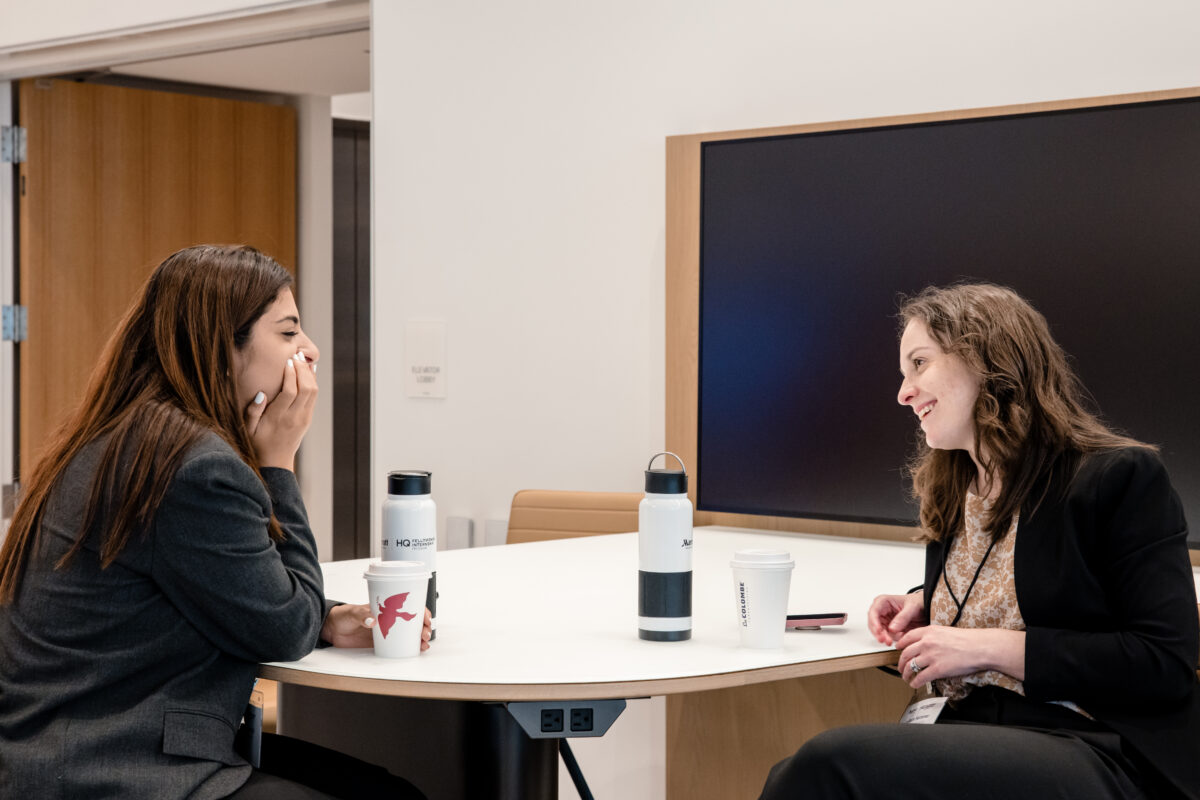
If you’re about to have an interview with a Marriott recruiter, congrats! You’ve made it through a competitive — and vast — pool of potential candidates and now it’s time to let your story and experience shine.
At this point, a Marriott recruiter has read your resume and knows all about your professional experience. So, the in-person or phone interview is about getting to know YOU, and the unique perspective you would bring to the position. This is why Marriott uses the STAR interview technique.
“We find that past performance is the best indicator of future behavior,” explains Charlotte Richards, Director of Executive Talent Acquisition. “By using the STAR method, the team learns how you handled past challenges and projects. We use that information to determine if you would be a good fit for the role and the company.”
→ See What Life Is Like at Marriott HQ
If you’re not familiar with the term, STAR is an acronym, and the interview style is structured around:
- Situations (S) you’ve experienced.
- Tasks (T) you have been assigned in your work life.
- Actions (A) you’ve taken to solve those tasks or manage those experiences.
- Results (R) you’ve obtained by setting those actions in motion.
So, in one of these interviews, be ready to articulate and share key moments in your career when you were faced with a challenge and were able to succeed because of your skills or your attitude towards the situation. As many of our associates have shared with us, preparing ahead of the interview by writing down those experiences and how they solved them helped them tremendously when it came time to share them in front of the recruiter.

Kelly Loss Photography
“Be prepared and be ready to tell a few stories, good stories that favor you and something you’re going to struggle through,” says Anthony R., HR Operations Manager.
“Try to have 3-5 different STARS [answers] ready to go for your interview based on previous work or school experience and please be SPECIFIC!” says Michael Wiszowaty, a Senior Manager in University Relations and Recruiting, who specializes in finding the best talent in the early stages of their careers.
“When describing the Situation and Task, it is important to set the stage, explain circumstances and describe what you were expected to accomplish,” explains Jean-Clay Couto, Director, Global Executive Talent Acquisition. “In Action, describe the specific steps you took, and skills used to address the challenge. When sharing the Result, demonstrate the specific impact of your action and if applicable, provide a quantifiable result.”
After his years of experience using this interviewing format, Jean-Clay recommends candidates to be succinct, always provide specific examples and, if possible, include measurable results.

Kelly Loss Photography
“They add significant weight to the impact of those examples,” he explains. “Interviewing can be nerve-racking but it’s essential not to rush through responses; instead, take the time to truly listen to the questions.”
And speaking of questions, for Sarah D’Angelo, Director of Talent Acquisition and University Recruitment, a big red flag in a STAR interview is when the candidate doesn’t ask any questions to the recruiter.
“What you shouldn’t ask is “How did you get started with Marriott?” You can research that,” Sarah explains. “What you really want to know about me, as a person who doesn’t have a hospitality-leaning resume or as a college student, is: “Why are you still with Marriott after all these years?” If you ask that, I’ll give you invaluable insight into our company culture and why many of our associates have had long careers here.”
“I always enjoy receiving questions that highlight why I like to work for Marriott because it allows me to share my experiences with the company that cannot be discovered online,” adds Michael.
In addition to our expert recruiters, our associates also have unique perspectives and advice to share on Marriott’s STAR interview. Here, we’ve compiled associate experiences from different departments and levels of management to share what they learned in the process. Grab a pen and paper!
Have an ‘Experience Bank’
“Throughout my career, one thing I’ve always done is reflect on big wins and difficult situations after a project wraps, making a note of these reflections in my phone so when I prepare for an interview, I have a bank of great experiences to pull in my STAR interview,” says Cathleen, Brand Manager for Distinctive Brands.
Rehearse With a Partner
“I love to practice walking through my scenarios with a friend – actually reciting the story out loud can help you prepare by ensuring you cover the right details and stay concise in your story,” adds Cathleen.
“Before applying to any role, I write down multiple STAR scenarios and review them over and over. I even record myself and listen to my answers to make sure that I am prepared,” recommends Alecia, a Catering Sales Director at the Marriott Marquis in Houston. “I would suggest reviewing STAR questions with a mentor, manager or person in leadership to provide feedback before interviewing.”

Kelly Loss Photography
Be Authentic
For Frank, a Hotel Manager at The Westin Peachtree Plaza, the first Marriott interview was extremely nerve wracking. He remembers being so concerned with saying the right thing and rambling. But as he got more experienced, he learned an important lesson that he used in interviews throughout his 16-year Marriott career.
“Over the years, I have learned that no one knows my story better than I do, and it’s my job to give [the recruiters] a clear look into my career and why my experience qualifies me,” says Frank. “Be your authentic self. Tell your story clearly and concisely.”
Tell a Story
“One trick that helped me then, and continues to help me,” adds Frank. “Is that I remember having conversations with my grandparents about their lives growing up in the 20s and 30s. They would tell their stories so beautifully that I felt as if I was there. That’s how I like to think of my storytelling in interviews. It’s your story to tell, so tell it.”

Kelly Loss Photography
Take Your Recruiter’s Guidance
Any interview for a role you’re excited about can be nerve-wracking, but if you’re worried about the STAR format in particular, don’t worry, as most of the associates we interview share, their recruiters were always helpful and ready to explain the process.
“I remember being stressed out about the STAR application process,” recalls Devona, a Senior Project Manager at HQ. “But I received so much guidance and input from the Human Resources team as well as my manager at the time around how to navigate the process and what to expect, that when I walked into the interview, I was stress-free and armed with everything I needed to just be myself and share my background.”
Tailor Your Answers for the Job
“I made sure to research the role thoroughly and understand the responsibilities, so I could align my answers with what the hiring manager was looking for in a candidate,” says Alecia. “I would advise candidates to be prepared to discuss specific examples of how they have handled challenging situations or gone above and beyond for a customer. Marriott values employees who are proactive, adaptable, and dedicated to providing exceptional service, so it’s important to showcase these qualities during the interview.”
→ Marriott Is Hiring! Find What You’re Looking For in a Career